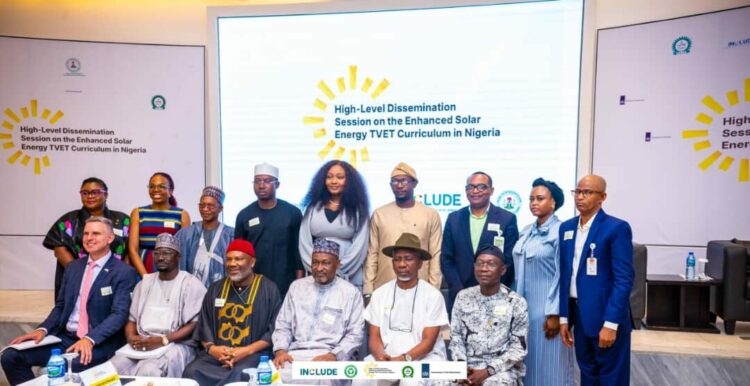Nigeria has taken a bold step towards strengthening its renewable energy sector with the unveiling of enhanced curricula and occupational standards for solar energy training.
The new framework, developed by the National Board for Technical Education (NBTE) in partnership with INCLUDE Knowledge Platform, the Government of the Netherlands, and the House Committee on Renewable Energy, was officially launched in Abuja.
Themed Green Skills and Political Will in the Renewable Energy Curriculum Review Initiative in Nigeria: Lessons in Leadership and Implementation, the event brought together lawmakers, government officials, technical educators, industry experts and international partners.
Honourable Victor Afam Ogene, Chair of the House Committee on Renewable Energy, praised the collaboration, describing the curricula as a turning point for Nigeria’s technical and vocational education system.
“This work has triggered a rethink of Nigeria’s skills architecture,” Ogene said.
“It will create socio-economic benefits, from enabling local content in the green economy to generating jobs.”
Ogene emphasised that youth employment and workforce development remain central to the House of Representatives’ legislative agenda.
He pledged continued parliamentary support for laws and policies that expand green jobs and bridge renewable energy skill gaps.
The enhanced curricula include updated modules for National Diploma in Renewable Energy, new Higher National Diploma programmes in Solar Thermal and Photovoltaic Engineering Technology, as well as National Occupational Standards for solar installation and maintenance.
Prof Idris Bugaje, NBTE Executive Secretary, highlighted the nearly five-decade-long Nigeria–Netherlands partnership as a catalyst for education reforms. He said the renewable curricula will equip Nigeria’s workforce to participate in the fourth industrial revolution.
He urged the government and stakeholders to invest in the global energy transition by supporting the implementation of the new programmes.
Dutch Ambassador Bengt van Loosdrecht described the initiative as critical for job creation in Nigeria’s energy transition. Deputy Head of Mission Ronald Sonnemas added that the harmonised curricula will drive innovation and sustainability.
Dr Abba Abubakar Aliyu, Managing Director of the Rural Electrification Agency (REA), stressed the importance of a skilled renewable workforce in tackling Nigeria’s energy deficit. He noted that structured training and private sector investment are key to positioning the country as a regional hub.
A symbolic handover of the commemorative curriculum set underscored the alignment of political, institutional and international support behind the initiative.
The session also marked the launch of a Training-of-Trainers (ToT) scheme that will equip more than 300 Technical and Vocational Education and Training (TVET) instructors across Nigeria’s six geopolitical zones with the expertise to deliver the new curricula.
Training will begin immediately, with sessions scheduled for Abuja, Lagos and Kano between August and September.











